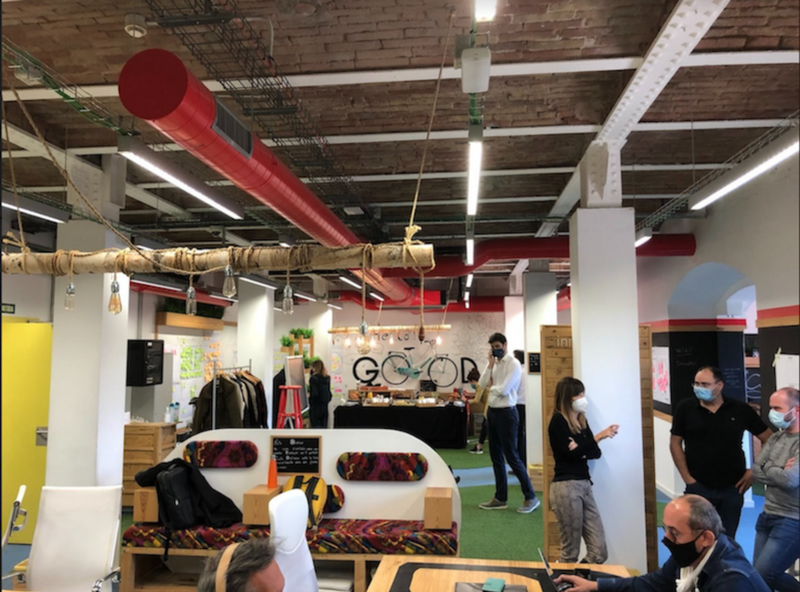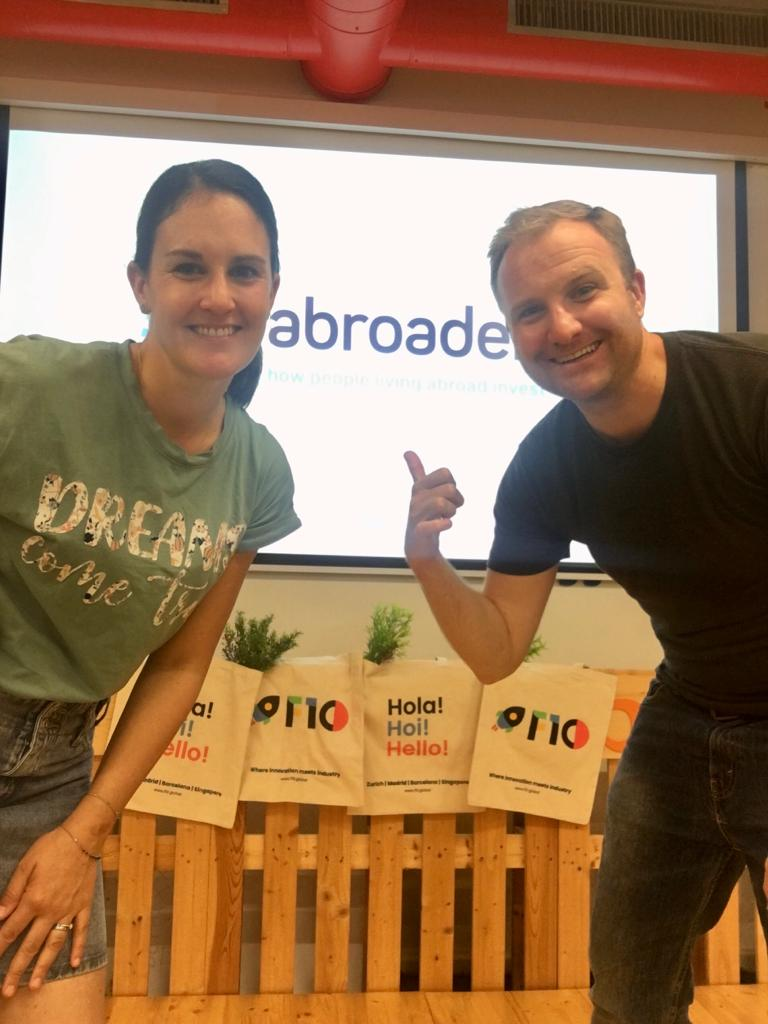Hi there!
My name is Elliott.
I’m the co-founder and CEO of abroaden. As a promising (:D) WealthTech startup, we were invited to participate in the F10 FinTech Incubator & Accelerator’s first incubation batch in Barcelona.
During my time, my friend Clemens from Barcinno let me guest post my journey through this transformative program.
If you haven’t read the previous installments, you can find the links at the top of this article.
In what will be my last installment, I’d like to reflect on what it’s like to go through an incubation program and why, if you’re an aspiring entrepreneur, you should. too.
Before diving into this, I want to be totally transparent: I’m writing this piece a couple of months after the program finished.
For one, I was mentally and even physically drained at the end.
Once demo day finished, I had to let the dust settle and recharge my batteries.
By the time summer finished (here in Spain, taking August off is mandatory), I felt there was enough distance since the end of the program to objectively gather my thoughts.
Here are my key takeaways.
It’s like being in a startup.
Incubators have a lot in common with the startups they’re nurturing. These programs are lean, agile, and more to the point, subject to sudden change.
We went through the first batch of F10 ever done in Spain. There were definitely some growing pains and learning experiences for everyone involved.
Some of these points include:
- last minute schedule changes
- shifting objectives
- being left on your own to figure things out (although that’s not necessarily a bad point).
However, successful entrepreneurs embrace chaotic change, which is kind of the point of what we’re doing anyway.
It’s also worth remembering that, in between the weeklong sessions, evening workshops, and other events, you still need to run your company.
Launching a startup is a full-time job, so throwing an incubation program on top certainly adds to your workload.
In that sense, you could think of it as going to school for a Master’s in the evening while working during the day.
If you’re going into an incubator, expect a certain level of disorganization and a hectic schedule, as it’s how these programs work.
Giant leap forward
For us at abroaden, F10 turbocharged us. Before going in, we had a good idea of the problem we wanted to solve. We had a rough sketch of how to get there, and an inkling of what it would take to become successful.
F10 helped us refine that process in ways we didn’t know possible. With their guidance, we re-validated and quantified our problem-market fit. Our MVP development, in turn, got a much more precise direction.
Finally, I cleaned and enhanced my pitch in ways I didn’t even know were possible. I hardly recognize my pitch deck from early March, let alone a year ago.
None of these advances would’ve been possible without this program, even if today, two-plus months on, I’m still tweaking and even rebuilding the work from earlier this year.
Opens doors and builds a network
Whether you like it or not, networking is nearly everything in the startup world. Before we got into F10, I struggled to connect to the local startup scene and build my network (although the pandemic certainly didn’t help).
Now, thanks mainly to the incubator, I’m better connected than I could possibly have hoped for. F10 did an excellent job introducing us to local partners and the ecosystem.
What’s more is that the program managers will do what they can to get you introductions to people you want to speak with.
I’ve used this capability a couple of times with stunning success (compare it to jumping a long-winding queue by sending a simple email).
Any incubation program should be able to help you build the network you need to survive and thrive.
Provides that first level of outside validation.
A founder could have the best idea in the world. Unfortunately, without any external recognition, he’ll likely struggle to go very far.
Furthermore, investors get pitched multiple times a day — both in person and via email.
Going through an incubation program gives you a credible backer that, while you might be “pre-product” or “pre-revenue,” you’re definitely worth at least listening to.
That acknowledgment is enormous. Even if it’s no guarantee of success, it certainly increases your odds of getting there.
New friends and amazing relationships
I met a ton of cool, humble people during my time in F10, most of whom were other founders. What we do is a lonely and misunderstood business. From the outside, it’s easy to mistake startup life as glamorous.
The reality is that we’re down-to-earth people who are deeply bought into our vision. Many of us are bootstrapping, giving up comfortable and lucrative jobs to chase our dreams. “Easy” isn’t a word we use to describe this endeavor.
I’ve had so many great laughs with my peers over the past few months. We’ve also supported each other in ways others probably couldn’t.
I can count these people as friends (and I hope they do the same).
Right, so if you’ve read this far, you might be considering joining an incubator.
Before you do, there are some points worth knowing.
Learn how to tell your problem in a story; especially if you’re still in the ‘idea’ phase.
Entrepreneurs with an early idea and naturally evangelical about their vision. (I know I was).
When pitching your concept, it’s way too easy to get carried away with your road map and the gritty details of how you’ll execute it.
After all, you’re mentally and even emotionally committed to your dream. Why wouldn’t you sell it as passionately as you can?
Therefore, when you get a chance to pitch, you’ll likely dive right into the details, using technical jargon to sell your vision.
There’s one small problem: incubator program managers and investors don’t have the prerequisite context to understand you.
The reaction here is to spend time bringing your audience up to speed. However, if you’re lucky enough to get an interview, you’ll only have a few minutes at most to pitch.
If you’re wasting time on the background details, you’re likely not going to get far in the application process.
Instead, focus on telling a simple, but compelling story.
Introduce your typical buyer persona and why she has a problem.
Explain the pain she faces having to deal with it. From there, become the hero she needs, and why there are many other people or companies just like her needing your product.
Within just a minute or two, you can sell the most technical solution to any layman.
If you do it with enough emotion, then your chances of getting into an incubation program increase significantly.
This storytelling technique isn’t just for the interview phase.
When you apply for an incubator, the first step involves filling out questionnaires. Storytelling works wonders here, too, especially since the people reviewing your application read hundreds of them at a time.
Not all programs are created equally
There are tons of incubation programs out there. While I can only speak for my experience in F10, it wasn’t the first incubator that I applied for.
When considering a program, do some research and read the website carefully.
- What’s the program like?
- Do you need to be there in person?
- Is there any funding involved?
- What type of participation do they expect from myself and my team?
A quick Google search and checking on forums like Reddit and Quora can give you insights about what to expect.
Don’t be afraid to get advice
On that, never hesitate to ask an alumni or even the program director himself.
I’ve had people reach out to me on LinkedIn asking my opinion about F10, and I’m always happy to share my thoughts. (You can find my contact details below).
What’s more, (good) program managers will be happy to answer any questions you might have.
Send them an email or find them on LinkedIn.
As a bonus, speaking to them before you apply will increase your chances of getting accepted.
Convertible notes and the price to join
Incubation and acceleration programs sometimes offer some form of funding to startups.
Generally, they’ll use what’s known as a convertible note to help their batch participants cover some costs.
A convertible note is a loan (“note”) that converts into an option to buy shares later on.
The program sees this as an investment as both a hedge and an incentive.
If they increase your chances of success, they’ll benefit, too. If you don’t, then their losses are minimal.
It’s worth noting that you will be giving up some of your company early on at discount, should you be successful.
Signing this note will impact the financial reward you receive over the long run, and that’s not an easy decision.
Here, I think it helps to put into perspective what the incubator program can do for you in exchange.
If they can open doors, help you build a better product, and ultimately raise money faster, then the cost is worth it.
However, that decision is ultimately up to you and your team to decide.
Be flexible and ready to pivot or even ready to drop out
Incubation programs focus on taking an idea or rough MVP, validating it, and making the business as attractive as possible to investors.
There’s a non-zero chance that, upon testing your idea with potential users, you’ll discover learnings you don’t like.
It could be you’re solving a problem that’s not so important to your target audience.
Your product might be completely infeasible from a cost and technology perspective.
You could even be building a solution to a problem that doesn’t exist.
In these cases, you’ll either need to pivot or throw in the towel.
I know; it sucks.
We had two startups drop out after the first month after testing their hypothesis.
Ultimately, it was for the best as they could focus on other endeavours. One participant was still part of the community during the program, joining us for social events (I consider him a friend).
Another wound up getting a job in a startup studio thanks in part to his experience in F10.
Whatever happens, be ready to move without getting too hung up on your beliefs.
As the great Daniel Kahneman once said:
“When I work I have no sunk costs. I like changing my mind. Some people really don’t like it but for me changing my mind is a thrill. It’s an indication that I’m learning something. So I have no sunk costs in the sense that I can walk away from an idea that I’ve worked on for
a year if I can see a better idea.”
That’s some solid advice.
I’m thoroughly thankful for the experience I went through.
I would recommend it to anyone wanting to build their entrepreneurial dream.
While I don’t have a reference for F10 as it’s been my first program (to date), I definitely think they put together a solid batch.
If you’re reading this, and want to know more about my experience, I’d be happy to chat. You can reach me on my LinkedIn page.
I think that’s it for me here, at least as far as my incubation adventure goes.
I want to thank Clemens, Scott, and the others at Barcinno for sharing my thoughts with you all.
Above all, thank you for reading.
It’s been a pleasure.






